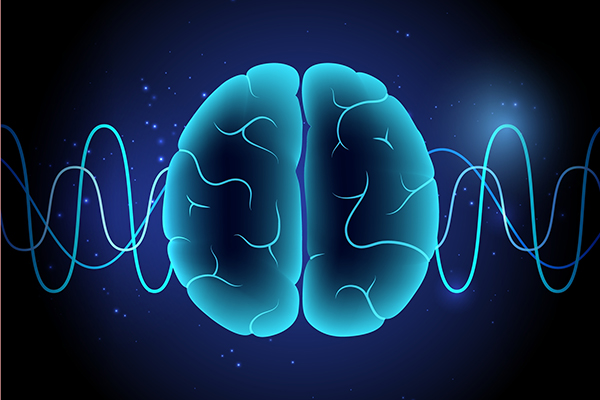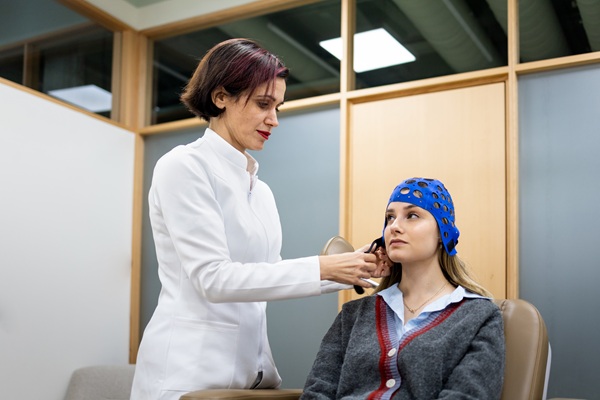Wellness Solutions: What Is Neurofeedback?

Neurofeedback has quickly become a popular option among patients living with a variety of mental and emotional disorders. It helps alleviate patient symptoms through a process of monitoring and focusing patient brainwaves in order to retrain and strengthen the brain for healthier activity. Neurofeedback has proven to be an effective treatment for patients experiencing symptoms from a variety of illnesses and disorders and as such, has steadily gained popularity in recent years.
What to expect from a neurofeedback session
Patients opting to try neurofeedback may need up to 20 weeks of sessions, though some will require fewer. The process of neurofeedback sessions is fairly simple but can lead to lasting and significant symptom relief for the patient. When a patient visits a neurofeedback therapist, they can expect to experience the following: First, the patient will have several sensors attached to their scalp. These sensors will continuously monitor brain function, brainwave frequency and patterns to assess the specific needs of the individual.
Once a patient has had their brainwaves analyzed by the neurofeedback therapist, they can begin the process of retraining. This involves the patient being presented with graphics and sounds, sort of like a video game. Through interacting with the graphics and images presented to them and receiving constant signals from neurofeedback, patients can retrain their brains to improve concentration, mood, thinking patterns, impulsivity and more.
Why neurofeedback works
Neurofeedback can be compared to mind-strengthening exercises, as neurofeedback helps the patient strengthen their control of mental and physical functions. It can also be compared to physical therapies. Stroke patients who have lost the function of their hands, for example, may be able to retrain and strengthen their hands through routine physical therapy. Through routine neurofeedback sessions, patients may be able to retrain and control concentration, positive thinking patterns and self-control. The goals of neurofeedback therapy are as follows:
- To stabilize brain function
- To improve the brain’s ability to produce brainwaves in healthy ranges
- To improve the speed, stability and duration of brainwave state shifts
- To improve the functioning of localized brain areas that may cause specific problems for the individual
Who can benefit from neurofeedback therapy?
Neurofeedback therapy is an excellent option for patients looking to retrain their brains for healthier and more efficient functioning. Neurofeedback therapy can also provide relief from a number of secondary symptoms associated with certain mental and neurological conditions. Patients with the following conditions may benefit from neurofeedback therapy: ADD/ADHD, depression, anxiety, addiction, bipolar disorder, behavioral/emotional problems, brain injury/birth injury, chronic pain/fatigue, insomnia/sleep disorders, OCD, PTSD, seizure disorders, migraines and more.
Though neurofeedback therapy can help such a wide variety of patients, it is important to remember that neurofeedback therapy cannot change your environment. Correcting a brain imbalance requires the full participation of the patient, and those taking medications, actively using narcotics or alcohol or living in particularly stressful conditions may not experience the full benefits of neurofeedback. Similarly, those with only minor imbalances may not find that they feel any change. Neurofeedback is an ideal option for those struggling to manage a neurological imbalance and are ready to commit to retraining their mind.
Let's get started
Request an appointment here: https://futurepsychsolutions.com or call Future Psych Solutions at (803) 335-5232 for an appointment in our Columbia office.
Check out what others are saying about our services on Yelp: Neurofeedback in Columbia, SC.
Recent Posts
Mental health plays a critical role in overall well-being, influencing thought patterns, emotional stability, and behavior. For those experiencing persistent challenges, a formal diagnosis can provide clarity and a structured approach to healing. With guidance from a psychiatrist, individuals can better understand their condition and begin a path toward long-term mental wellness.A mental health diagnosis…
Are you looking for a TMS doctor? A TMS doctor is one that offers Transcranial magnetic stimulation to treat patients with major depressive disorder, which is also called MDD or clinical depression. Every TMS doctor utilizes their own method of treatment and many practices under other titles such as that of a psychiatrist. Learning more…
Post-traumatic stress disorder (PTSD) is a mental health condition that can develop after experiencing or witnessing a traumatic event. PTSD treatment aims to reduce symptoms and help people function better in their daily lives. It also focuses on improving their overall health and well-being. PTSD often causes anxiety, flashbacks, and emotional distress, making effective treatment…
Everyone experiences occasional anxiety, but an anxiety disorder involves persistent, excessive worry and physical symptoms that can disrupt daily routines, relationships, and overall well-being. If left untreated, these symptoms can intensify, impacting mental and physical health. Seeking help from a psychiatrist can be a significant first step toward effectively managing anxiety disorder symptoms and getting…


